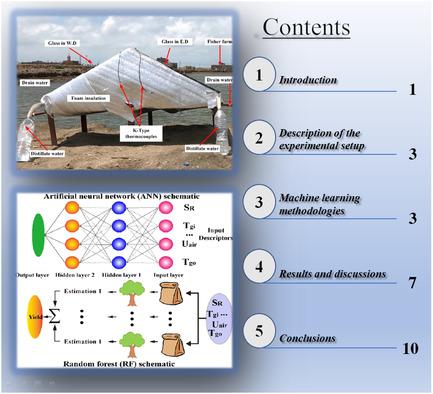当前位置:
X-MOL 学术
›
Energy Technol.
›
论文详情
Our official English website, www.x-mol.net, welcomes your feedback! (Note: you will need to create a separate account there.)
Productivity Modeling Enhancement of a Solar Desalination Unit with Nanofluids Using Machine Learning Algorithms Integrated with Bayesian Optimization
Energy Technology ( IF 3.8 ) Pub Date : 2021-07-01 , DOI: 10.1002/ente.202100189 A.W. Kandeal 1, 2 , Meng An 3, 4, 5 , Xiangquan Chen 6 , Almoataz M. Algazzar 2 , Amrit Kumar Thakur 6 , Xiaoyu Guan 7 , Jianyong Wang 3 , M.R. Elkadeem 7 , Weigang Ma 4, 5 , Swellam W. Sharshir 1, 2
Energy Technology ( IF 3.8 ) Pub Date : 2021-07-01 , DOI: 10.1002/ente.202100189 A.W. Kandeal 1, 2 , Meng An 3, 4, 5 , Xiangquan Chen 6 , Almoataz M. Algazzar 2 , Amrit Kumar Thakur 6 , Xiaoyu Guan 7 , Jianyong Wang 3 , M.R. Elkadeem 7 , Weigang Ma 4, 5 , Swellam W. Sharshir 1, 2
Affiliation

|
Herein, double slope solar still (DSSS) performance is accurately forecast with the aid of four different machine learning (ML) models, namely, artificial neural network (ANN), random forest (RF), support vector regression (SVR), and linear SVR. Furthermore, the tuning of ML models is optimized using the Bayesian optimization algorithm (BOA) to get the optimal performance of all models and identify the best predictive one. All the models are trained, tested, and validated depending on experimental data acquired under Egyptian climatic conditions. The results reveal that ML models can be a powerful tool to forecast DSSS performance. Among them, RF is the most potent ML model obtaining the highest determination coefficient (R2) and the lowest absolute error percentage of 0.997% and 2.95%, respectively. Furthermore, the experimental results also show that the mean value of accumulated (daily) freshwater productivity from DSSS is 4.3 L m−2.
中文翻译:

使用与贝叶斯优化相结合的机器学习算法增强纳米流体太阳能海水淡化装置的生产力建模
在此,借助四种不同的机器学习 (ML) 模型,即人工神经网络 (ANN)、随机森林 (RF)、支持向量回归 (SVR) 和线性SVR。此外,使用贝叶斯优化算法 (BOA) 优化 ML 模型的调整,以获得所有模型的最佳性能并确定最佳预测模型。所有模型都根据在埃及气候条件下获得的实验数据进行训练、测试和验证。结果表明,ML 模型可以成为预测 DSSS 性能的强大工具。其中,RF 是最有效的 ML 模型,获得了最高的决定系数(R 2) 和最低绝对误差百分比分别为 0.997% 和 2.95%。此外,实验结果还表明,DSSS 累积(日)淡水生产力的平均值为 4.3 L m -2。
更新日期:2021-09-09
中文翻译:

使用与贝叶斯优化相结合的机器学习算法增强纳米流体太阳能海水淡化装置的生产力建模
在此,借助四种不同的机器学习 (ML) 模型,即人工神经网络 (ANN)、随机森林 (RF)、支持向量回归 (SVR) 和线性SVR。此外,使用贝叶斯优化算法 (BOA) 优化 ML 模型的调整,以获得所有模型的最佳性能并确定最佳预测模型。所有模型都根据在埃及气候条件下获得的实验数据进行训练、测试和验证。结果表明,ML 模型可以成为预测 DSSS 性能的强大工具。其中,RF 是最有效的 ML 模型,获得了最高的决定系数(R 2) 和最低绝对误差百分比分别为 0.997% 和 2.95%。此外,实验结果还表明,DSSS 累积(日)淡水生产力的平均值为 4.3 L m -2。



























 京公网安备 11010802027423号
京公网安备 11010802027423号